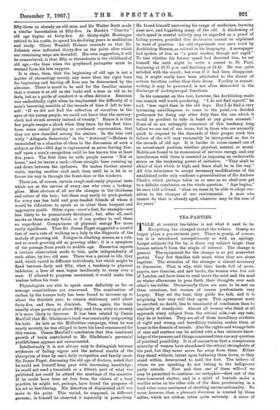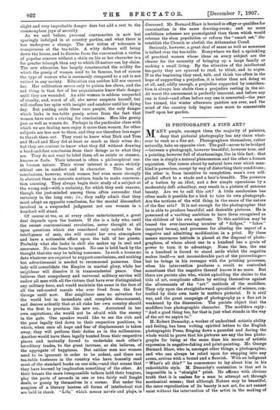TEA-PARTIES.
TALK at country tea-tables is not what it used to be. Everything has changed except the talkers. Gossip no longer plays a pre-eminent part. • There is gossip, of course, but it is introduced surreptitiously or with an apology.. Larger subjects (by the by, is there any subject larger than human nature ?) form the staple of interest. The change is general. The equipment for the change is as yet somewhat partial. Very few families talk much when they are alone together. The stimulus of the stranger is almost necessary to discussion. That is why, with their heads full of news; papers, new theories, and new books, the women who live out of London and have time to read brave the mist and the mud on winter afternoons to pour forth their thoughts over each other's tea-tables. Occasionally there are men to be met on these occasions, but women of course predominate very largely. They set the tone, they guide the talk, and it is surprising how very well they agree. This agreement must be ascribed, no doubt, less to unanimity of conclusion than to similarity of standpoint. Almost all women who think at all approach every subject from the ethical side,—at any rate, they do at teatime. They are all of them hereditary students of right and wrong, and hereditary training makes them at home in the domain of morals. Also the rights and wrongs both of men and matters can be settled with a less intimate know- ledge of the persons and things concerned than can any question of practical possibility. It is of course true that a conspicuous minority of women have abandoned the ethical strongholds of the past, but they never move far away from them. Either they stand without, intent upon battering them down, or they stand within, determined to hold the fort. The talkers of whom we are speaking do not belong to the belligerent party outside. Now and then one of them will—if we maybe permitted to continue our metaphor—dart out of the time-hononred shelter, and in a spirit of bravado make a warlike noise on the other side of the door, proclaiming in a loud voice some sentiment of startling unconventionality. No more, however, than a pleasant diversion is created by these sallies; which are seldom taken quite seriously. A sense of
slight and very improbable danger does but add a zest to the commonplace joys of security. As we said before, personal conversation is now but sparingly indulged in at country parties, and what there is has undergone a change. The new virtue of tolerance is conspicuous at the tea-table. A witty defence will bring down the house, and to dismiss from the conversation a victim of popular censure without a stain on his or her character is a far greater triumph than any to which ill-nature can lay claim. The uew education has largely counteracted the acidity for which the gossip of women used to be famous, but of course the type of woman who is commonly compared to a cat is not extinct in any society. Education can neither kill nor correct her. Her cultivation serves only to poison her claws, and the sad thing is that few of her acquaintance know their danger until they are wounded. An able woman is seldom suspected of cruelty, and, worst of all, she never suspects herself, but will confuse her spite with insight and candour until her dying day. But putting aside these rare people, the only danger Which lurks in tea-table gossip arises from the fact that women have such a craving for conclusions. Men like gossip just as well as women do. Perhaps in the particular class with which we are dealing men enjoy it more than women, for other subjects are less new to them, and they are therefore less eager to thrash them out. They want to know what Dick and Tom and Maud and Mary did at least as much as their wives do ; but they are content to know what they did without drawing a hard-and-fast conclusion from their doings as to what they are. They do not want to label them all as saints or sinners, knaves or fools. Their interest is often a philosophical one in human nature. Their wives' interest is a more strictly
ethical one in conduct and in character. This love of conclusions, however, which women feel even more strongly in abstract than in concrete matters, tends to make conversa- tion amusing. They always begin their study of a subject at the wrong end—with a certainty, for which they seek reasons, though the just-minded among them often surrender that certainty in the long run; i.e., they sadly admit that they must adopt an opposite conclusion, for the mental discomfort involved in a suspended judgment not one woman in a hundred will stand.
Of course at tea, as at every other entertainment, a great deal depends upon the hostess. If she is a lady who, until the recent conversational revolution, never thought at all upon questions which she considered only suited to the intelligence of men, she will create her own atmosphere and have a noticeable effect upon the talk of her guests. Probably what she lacks in skill she makes up in zeal and assurance. No one fears to speak. No one is held back by the thought that she may be talking nonsense. In such a house no data whatever are required to support conclusions, and nothing but advertisement is needed to recommend panaceas. One lady will consolidate the Empire in martial glory, while her neighbour will dissolve it in transcendental peace. One believes that compulsory and universal military service will endow all men with all the virtues that have ever distinguished any military hero, and would maintain the same in the face of all the red-coated rascals who ever lived from the first George until now. Her neighbour sees no salvation for the world but in immediate and complete disarmament, and desires ardently that at all risks her own country should be the first to proclaim the new era. Accoutred in her own aspirations, she would not be afraid with the enemy in the gate. One speaker would like to see the rich and the poor legally tied down to their respective positions, in which, when once all hope and fear of displacement is taken away, they will perform their duties as in the millennium. Another would have them legally hunted from their respective places and mutually forced to undertake each other's hereditary trades,' to the great increase, as she believes, of the aggregate of happiness. But neither men nor women need to be ignorant in order to be ardent, and there are tea-table hostesses in the country who have honestly read most of the standard books on one side,—and that means that they have learned by implication something of the other. At their houses the more irresponsible talkers hold their tongues, play the parts of seconds in one or two fairly well fought duels, or gossip by themselves in a corner. But under the auspices of a literary hostess all forms of intellectual riot are held in check. "Life," which means novels and plays, is discussed. Mr. Bernard Shaw is burned in effigy or qualifies for canonisation in the same drawing-room ; and no more ambitious schemes are promulgated than those which would rehouse the slum population or reform the "smart set," dis- establish the Church or abolish the Athanasian Creed.
Seriously, however, a great deal of sense as well as nonsense is talked over the tea-table. Everywhere we find a sprinkling of practical women whose ideas on every subject are the clearer for the necessity of bringing up a large family or making a small living. By the stimulus of the intellectual tea-party they are spurred to read, to think, and to argue. If in the beginning they read, talk, and think too often in the hope of supporting a prejudice, it is better than not doing so at all, and, oddly enough, a prejudice supported by considera- tion is always less stable than a prejudice resting in the air. At worst the amusement is perfectly innocent, and before any one is tired—and often before any one is converted—the year has turned, the winter afternoon gaieties are over, and the mind of the country lady begins once more to concentrate itself upon her garden.











































































 Previous page
Previous page